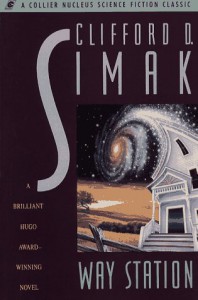Way Station (A Collier Nucleus Science Fiction Classics)
 The first science fiction book I have ever read was [b:All Flesh Is Grass|876268|All Flesh is Grass|Clifford D. Simak|https://d.gr-assets.com/books/1233845467s/876268.jpg|2490608] by Clifford D. Simak. I was so astonished and entertained that I immediately looked for more sf to read and to this day I still prefer reading sf than any other form of fiction. Yes, I should broaden my horizon and read more literary fiction or classics which I do from time to time but I will always favor sf. So I owe a debt of gratitude to Mr. Simak for helping me find my reading comfort zone. Any way, All Flesh Is Grass is not Simak's best book as I soon found out, Way Station is.
The first science fiction book I have ever read was [b:All Flesh Is Grass|876268|All Flesh is Grass|Clifford D. Simak|https://d.gr-assets.com/books/1233845467s/876268.jpg|2490608] by Clifford D. Simak. I was so astonished and entertained that I immediately looked for more sf to read and to this day I still prefer reading sf than any other form of fiction. Yes, I should broaden my horizon and read more literary fiction or classics which I do from time to time but I will always favor sf. So I owe a debt of gratitude to Mr. Simak for helping me find my reading comfort zone. Any way, All Flesh Is Grass is not Simak's best book as I soon found out, Way Station is.Way Station won Simak a Hugo award in 1964, in a nut shell it is a story of a man who runs a way station for intergalactic FTL traveling network, Earth branch. For his services he does not age while within the station, which is his house completely modified by alien techs. He also gets a lot of alien freebies and gifts from travelers and as much alien technology, info and knowhow as he can manage to comprehend, not to mention a virtual alien safari for target practice. What's not to like eh? The downside is that his neighbors think he is weird and outrageously immortal but they don't inform the media or the authorities because they don't want the press, the military etc. disturbing their idyllic rural lives.
This is a reread for me, I reread very few books, there are just too many books in the world that I have not read. Fortunately (or not) I have a memory like a sieve so rereads are generally more than worthwhile. Coming back to this book I was skeptical about Simak's FTL travel idea. Basically the travelers teleport from one planet to another via stations. What then - I thought - is the point of of having way stations? Why not just teleport directly to your destination? Simak dealt with this issue nicely, there are areas of high ionization that distort and disrupt the travelling pattern. There is still a flaw in the idea though, travelers are duplicated from the point of departure to the point of arrival leaving a corpse behind. They don't simply dematerialize and rematerialize. So the tech is more like cloning than transportation and the travelers are actually committing suicide! I would not want to travel like that, to hell with my clone, he can't have my life! Unfortunately Simak did not deal with this issue.
But I digress, the story is more concerned with loyalty to the human race, mankind's tendency to make wars, a brotherhood of man (and aliens), and what it means to be human (always a good theme). Simak was not a sophisticated wordsmith like Jack Vance or Gene Wolfe, he writes fairly simplistic prose, not inarticulate, just without much in the way of verbal flourishes. I believe he was well aware of this and used the simplicity of his prose to maximum effect. The strength of his prose lies in its clarity and visual quality, so reading his stories you never have to reach for a dictionary and it is easy to picture the scenes he is describing no matter how otherworldly. Another constant feature of his works is his compassion, warmth and optimism. His characters are rarely prone to violence and while recognizing how flawed the human race is he was still optimistic that our over all goodness will pull us through.
Way Station is fast paced without actually being action packed. A lot of the technology is outdated, Simak was never a hard sf writer, he was no Arthur C. Clarke. Also, neologism was not his bag, for example the alien communication machine is simply called "message machine", and his mention of "the thaumaturgists from Alphard XXII" made me snigger a bit (sorry Cliff). At the end of the day though you have to indulge Simak a little given that he wrote this in the 60s. If you are fans of modern sf by the likes of Iain M. Banks, Alastair Reynolds and Neal Stephenson the simple fares that Simak has to offer may not be for you, but if you are in the mood for a simple, uncomplicated, pastoral science fiction reading Way Station may be just the ticket. Also highly recommended for young readers and new sf readers.
-----------------
Note: This Guardian article on Simak is excellent, it explains a little about the late lamented pastoral science fiction sub-genre.



